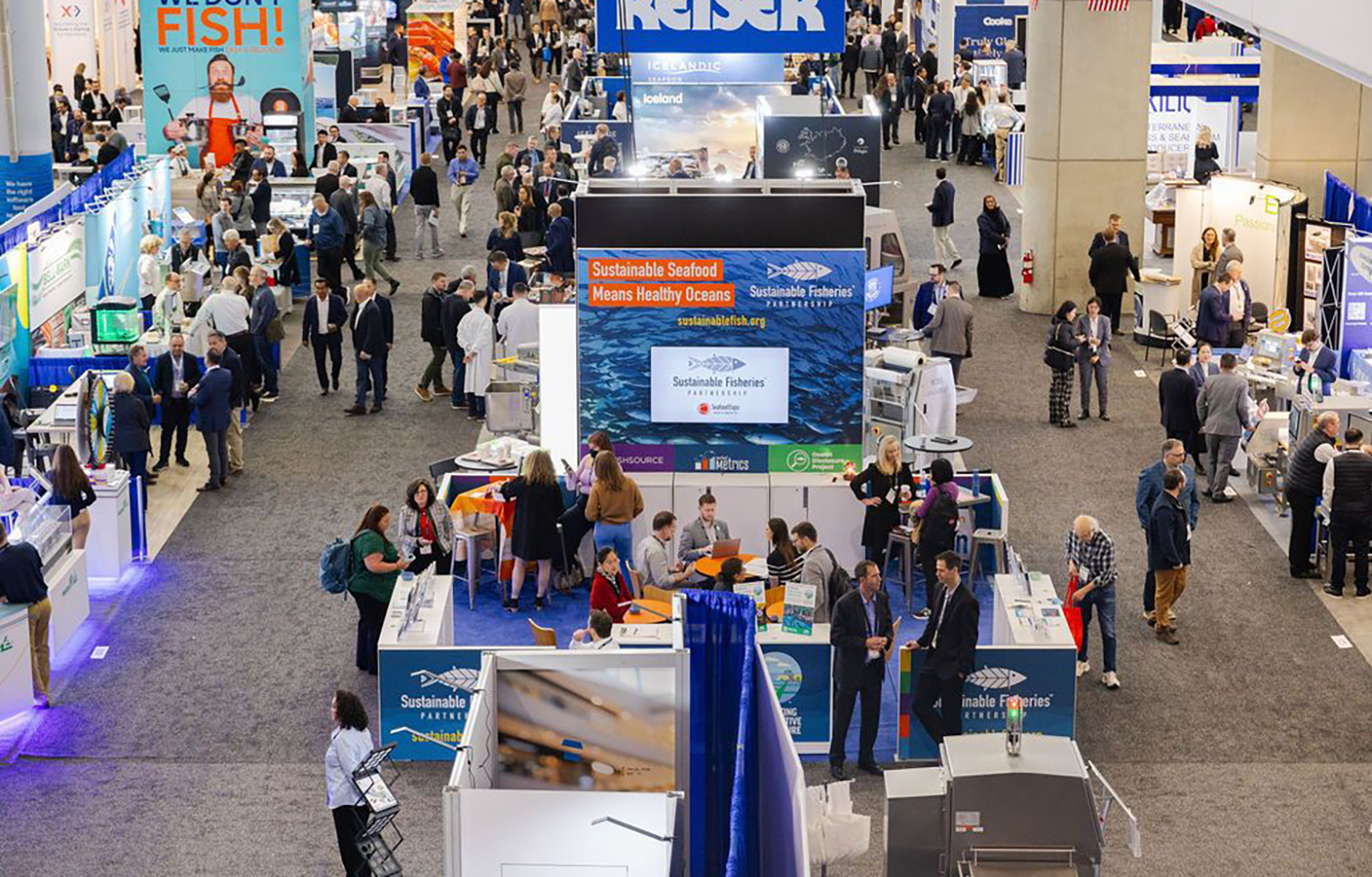The Sustainable Fisheries Partnership (SFP) works at all levels of the seafood supply chain to achieve steady and continuous improvements in fisheries and seafood production.
At the 2024 Seafood Expo North America (SENA), which took place from 10 to 12 March in Boston, Massachusetts, U.S.A., SFP highlighted its innovative approaches to engaging industry, such as through their Supply Chain Roundtables; its support for effective small-scale fishery co-management; and its Bycatch Solutions Hub, which connects seafood companies and other industry players in an attempt to reverse the decline of ocean wildlife populations.
SeafoodSource spoke with SFP staff about their approaches to working with the seafood industry and some of the projects they are working on now.
SeafoodSource: SFP has a number of programs they are showcasing at SENA, and there seems to be a common theme of industry-driven solutions woven into each. Is that part of SFP’s approach?
Megan Westmeyer (Supply Chain Roundtables Director, specializing in Mexican and U.S. Gulf of Mexico shrimp, as well as Mexican snapper and grouper): That’s not just part of SFP’s approach, it is SFP’s approach. We have a long history of collaborating with industry to improve fishery and aquaculture sustainability because we recognize that no one is better positioned to drive lasting change in the seafood industry than the industry itself. Our role is to act as a provider of information and actionable advice; their role is to undertake action and affect change.
SeafoodSource: Is working in partnership to solve problems the idea behind the roundtables?
Westmeyer: Yes, definitely. Our supply chain roundtables are pre-competitive collaborations of middle supply chain companies that recognize that true fishery and aquaculture sustainability cannot be achieved by individual supply chains. These companies compete with one another on a daily basis in a variety of ways – such as quality, price, and customer service – but understand that they cannot compete on the basis of sustainability if they are sourcing from the same fishery or aquaculture region. They recognize the value in uniting their efforts for sustainability and look to SFP to facilitate a space for collaboration and provide high-quality advice.
SeafoodSource: SFP also advocates for co-management for small-scale fisheries. How does that help the fisheries and how does it help the supply chain?
Amber Von Harten: (Supply Chain Roundtables Director, specializing in global mahi and Indonesian snapper and grouper): Small-scale fisheries produce 40 percent of the world’s total catch and play a significant role in both the international and domestic markets. Despite this significance, many small-scale fisheries lack adequate management that ensures fishers have legal fishing rights and are actively participating in management. To address this issue, co-management approaches in small-scale fisheries are needed to achieve lasting and long-term sustainability of a fishery.
Legal fishing rights provide fishers with secure rights to access their fishery, as well as formal recognition as a stakeholder with the opportunity to organize themselves and contribute to decision-making in the management of the fishery. These co-management conditions provide social, economic, and livelihood benefits for fishers that ultimately will provide positive impacts to the fishery as a whole.
Fishers being legally registered also helps businesses ensure that the products they source are coming from legal supply chains, lowering the risk of illegal, unreported, and unregulated fishing. Fisheries that are inclusive of fishers in the management process are also more likely to develop effective management strategies that consider the contributions of fishers. These considerations can help pave the way to achieve long-term sustainable management of fisheries with benefits to stock health and the entire supply chain creating a responsible seafood sector.
SeafoodSource: SFP’s Bycatch Solutions Hub is now a year old. How did that program start, and how’s it going?
Phillip Sanchez (SFP Bycatch Programs Coordinator): The idea for the Bycatch Solutions Hub came from SFP’s response to questions from seafood industry representatives concerned about bycatch within their supply chain. Companies wanted to know that concrete actions could be taken to support effective, positive change in sourcing from fisheries that will reduce bycatch risk. While a seemingly simple question, the complexity of the supply chain from vessel to retailer creates a web of confusion that often obscures even the most direct attempts at understanding fishery sourcing policies, not to mention their environmental impacts. There is a reason bycatch remains a difficult problem to solve in making fisheries more sustainable.
SFP is an organization that has partnered with some of the largest retailers in the supply chain, is composed of individuals with fisheries expertise, and works closely with on-the-ground fisheries organizations and associations.Therefore, the organization has a unique ability to connect the two ends of the supply chain to stimulate implementation of bycatch mitigation in fisheries through support from the seafood industry.
The Bycatch Solutions Showcase is an indication of our progress in connecting the different ends of the seafood supply chain in the first year of the Bycatch Solutions Hub. Over the last year, we have collaborated with fisheries associations, FIPs, NGOs, private organizations, and government bycatch programs to develop bycatch mitigation work plans in diverse fisheries and geographic regions that need the support of the seafood industry. So far, we have raised over USD 250,000 (EUR 230,300) to support bycatch mitigation efforts.
The nine bycatch mitigation projects showcased, four of which are already funded, span from Alaska to Chile and from California to Vietnam and include four of the five main industrial fishing methods. Over the next year, we hope to build on this momentum and, in doing so, strengthen the connection between the fishers and retailers in complex segments of the seafood supply chain.








